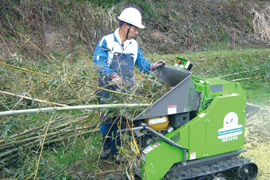The Mitsui & Co. Environment Fund
Introduction to Grant Projects
NPO Ine Oasa (recommended by the Mitsui & Co. Chugoku Office)
Proving the feasability of bamboo as an organic fertilizer by using it to cultivate rapeseed, advancing the Nanohana Project
Activity grant
- Project Description
In recent years, bamboo has been growing wild in the mountain forests of Japan and it is having a negative effect on the growth of broad-leaved tree species crucial to maintaining forest functions. This project aims to develop regional resource-recycling initiatives such as using logged bamboo to cultivate rapeseed. Specifically, this involves: (1) testing bamboo chips as a fertilizer and verifying its effects on rapeseed cultivation, (2) turning bamboo charcoal into a fuel source, and (3) reducing bamboo damage, commodifying the fertilizer, and creating accompanying business models that develop regional agriculture and encourage farming collectives. This action is expected to encourage growth of broad-leaved tree species, enable the abundant growth of resources that produce economic benefits such as mountain vegetables, and also reduce traffic hazards and crime. Furthermore, if development of bamboo fertilizer goes smoothly, it will reduce the operating costs of fertilizer centers, encourage farming collectives and environmentally-friendly agriculture, and increase earnings for farming families.
- Fields
- Preservation of surface soil and forestsPreservation of biodiversity and ecosystem
- Grant year
- FY2010 Activity Grants
- Grant term
- 1 years
October 2010 - September 2011
- Grant amount
- 1,000,000 yen
- Activity region
- Oasa, Kitahiroshima, Hiroshima Prefecture, Japan

Overview of the Organization

- Representative
- Tetsuhiro Yasuda, Director
- Establishment
- 2001
- Establishment purpose
- The Nanohana Project is a means of advocating and executing environmental conservation that values the unique natural environment of Oasa and will preserve it for generations to come. This initiative aims to realize a recycling-orientated society and develop a lively, sustainable region by encouraging citizen engagement, nurturing youth, increasing population and fostering demand.
- Main area of activity
- Oasa, Kitahiroshima, Hiroshima Prefecture, Japan
- Staff
- 2 part-time staff members, 23 full members
- Annual operating budget
- 5.88 million yen in 2007, 14.69 million yen in 2008, 11.45 million yen in 2009
- WEB site
- http://www.e-jyan.jp
- Recent activity
- The Nanohana Project grows rapeseed, collects waste cooking oil and produces biodiesel fuel. Core activities are as follows:
- (1) Working with local elementary schools to develop an environmental education curriculum and holding lessons onsite
- (2) Cultivating and selling high added-value 'Pure Na' rice
- (3) Logging bamboo, which damages the landscape and causes traffic damage, and turning it into chips for use as a fertilizer